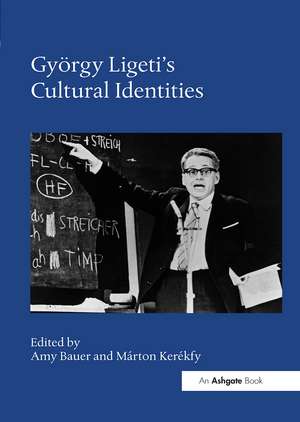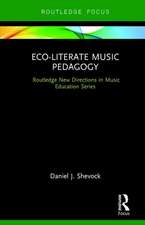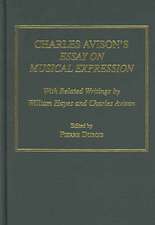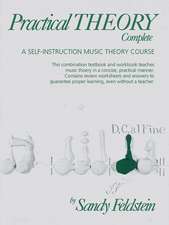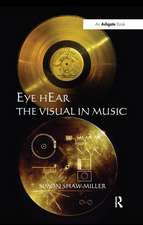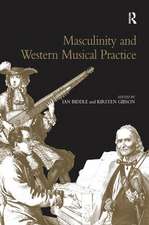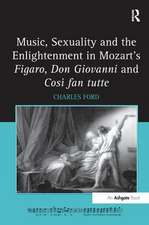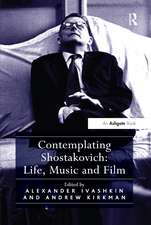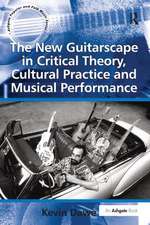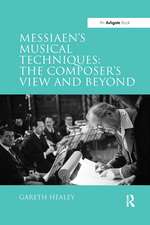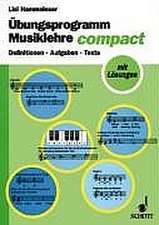György Ligeti's Cultural Identities
Editat de Amy Bauer, Márton Kerékfyen Limba Engleză Hardback – 29 sep 2017
| Toate formatele și edițiile | Preț | Express |
|---|---|---|
| Paperback (1) | 260.03 lei 6-8 săpt. | |
| Taylor & Francis – 4 feb 2019 | 260.03 lei 6-8 săpt. | |
| Hardback (1) | 759.80 lei 6-8 săpt. | |
| Taylor & Francis – 29 sep 2017 | 759.80 lei 6-8 săpt. |
Preț: 759.80 lei
Preț vechi: 1027.40 lei
-26% Nou
Puncte Express: 1140
Preț estimativ în valută:
145.41€ • 153.39$ • 121.53£
145.41€ • 153.39$ • 121.53£
Carte tipărită la comandă
Livrare economică 31 decembrie 24 - 14 ianuarie 25
Preluare comenzi: 021 569.72.76
Specificații
ISBN-13: 9781472473646
ISBN-10: 1472473647
Pagini: 288
Ilustrații: 51 Line drawings, black and white; 27 Halftones, black and white; 1 Tables, black and white
Dimensiuni: 156 x 234 x 18 mm
Greutate: 0.45 kg
Ediția:1Adnotată
Editura: Taylor & Francis
Colecția Routledge
Locul publicării:Oxford, United Kingdom
ISBN-10: 1472473647
Pagini: 288
Ilustrații: 51 Line drawings, black and white; 27 Halftones, black and white; 1 Tables, black and white
Dimensiuni: 156 x 234 x 18 mm
Greutate: 0.45 kg
Ediția:1Adnotată
Editura: Taylor & Francis
Colecția Routledge
Locul publicării:Oxford, United Kingdom
Cuprins
Introduction
Amy Bauer and Márton Kerékfy
Part I, Creative Personality and Aesthetics
1 Music in the Technological Era
György Ligeti with Hans Heinz Stuckenschmidt, translated and annotated by Louise Duchesneau
2 ‘…music is a bit like love – you do it but you don’t talk about it’
Louise Duchesneau
3 The Innate Melodist
Richard Steinitz
4 Ligeti’s Musical Style as Expression of Cultural Trauma
Wolfgang Marx
5 Making It Home? The Natural Sciences as a Site of Belonging in György Ligeti’s Music
Frederik Knop
Part II, Influences and Backgrounds
6 Reflections on Ligeti’s Jewish Identity Following the Discovery of New Documents from his Cluj Years
Heidy Zimmermann
7 Ligeti and Romanian Folk Music: An Insight from the Paul Sacher Foundation
Bianca Ţiplea Temeş
8 Ligeti and the Beginnings of Bartók Analysis in Hungary
Anna Dalos
9 Bartók, Ligeti and the Innovative Middle Road
Peter Edwards
10 From Row to Klang: Ligeti’s Reception of Anton Webern’s Music
Ingrid Pustijanac
Part III, Works
11 Genre as Émigré: The Return of the Repressed in Ligeti’s Second Quartet
Amy Bauer
12 Sketches Reflecting the Images of San Francisco
Kyoko Okumura
13 Ironic Self-Portraits? Ligeti’s Hungarian Rock and Passacaglia ungherese
Márton Kerékfy
14 Tragedy and Irony: The Passacaglia of the Violin Concerto
Volker Helbing
Amy Bauer and Márton Kerékfy
Part I, Creative Personality and Aesthetics
1 Music in the Technological Era
György Ligeti with Hans Heinz Stuckenschmidt, translated and annotated by Louise Duchesneau
2 ‘…music is a bit like love – you do it but you don’t talk about it’
Louise Duchesneau
3 The Innate Melodist
Richard Steinitz
4 Ligeti’s Musical Style as Expression of Cultural Trauma
Wolfgang Marx
5 Making It Home? The Natural Sciences as a Site of Belonging in György Ligeti’s Music
Frederik Knop
Part II, Influences and Backgrounds
6 Reflections on Ligeti’s Jewish Identity Following the Discovery of New Documents from his Cluj Years
Heidy Zimmermann
7 Ligeti and Romanian Folk Music: An Insight from the Paul Sacher Foundation
Bianca Ţiplea Temeş
8 Ligeti and the Beginnings of Bartók Analysis in Hungary
Anna Dalos
9 Bartók, Ligeti and the Innovative Middle Road
Peter Edwards
10 From Row to Klang: Ligeti’s Reception of Anton Webern’s Music
Ingrid Pustijanac
Part III, Works
11 Genre as Émigré: The Return of the Repressed in Ligeti’s Second Quartet
Amy Bauer
12 Sketches Reflecting the Images of San Francisco
Kyoko Okumura
13 Ironic Self-Portraits? Ligeti’s Hungarian Rock and Passacaglia ungherese
Márton Kerékfy
14 Tragedy and Irony: The Passacaglia of the Violin Concerto
Volker Helbing
Notă biografică
Amy Bauer is Associate Professor of Music at the University of California, Irvine. She received her PhD in music theory from Yale University, and has published articles in Music Analysis, The Journal of Music Theory, Contemporary Music Review, Indiana Theory Review and Ars Lyrica, and book chapters on the music of Ligeti, Messiaen, Chávez, Lang, the television musical, modernist opera and issues in the philosophy and reception of modernist music. Her monograph Ligeti’s Laments: Nostalgia, Exoticism and the Absolute (2011) provides a critical analysis of the composer’s works, considering both the compositions themselves and the larger cultural implications of their reception.
Márton Kerékfy is Research Fellow at the Budapest Bartók Archives, Editor of the Béla Bartók Complete Critical Edition and Editor-in-Chief at Editio Musica Budapest. He studied musicology and composition at the Franz Liszt Academy of Music in Budapest and received his PhD in musicology from the same institution. His doctoral thesis (2014) explores the influence of East European folk music in György Ligeti’s music. He has published articles on the music of Ligeti and Bartók in, among others, Tempo, Studia Musicologica and Mitteilungen der Paul Sacher Stiftung. He translated into Hungarian and edited Ligeti’s selected writings (2010).
Márton Kerékfy is Research Fellow at the Budapest Bartók Archives, Editor of the Béla Bartók Complete Critical Edition and Editor-in-Chief at Editio Musica Budapest. He studied musicology and composition at the Franz Liszt Academy of Music in Budapest and received his PhD in musicology from the same institution. His doctoral thesis (2014) explores the influence of East European folk music in György Ligeti’s music. He has published articles on the music of Ligeti and Bartók in, among others, Tempo, Studia Musicologica and Mitteilungen der Paul Sacher Stiftung. He translated into Hungarian and edited Ligeti’s selected writings (2010).
Descriere
Since György Ligeti’s death in 2006, there has been a growing acknowledgement of how central he was to the late twentieth-century cultural landscape. This collection is the first book devoted to exploring the composer’s life and music within the context of his East European roots, revealing his dual identities as both Hungarian national and cosmopolitan modernist. Contributors explore the artistic and socio-cultural contexts of Ligeti’s early works, including composition and music theory; the influence of East European folk music; notions of home and identity; his ambivalent attitude to his Hungarian past and his references to his homeland in his later music.
